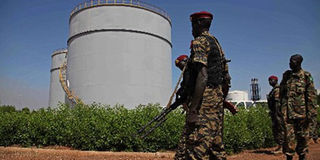Relief as first South Sudan oil reaches Sudan

South Sudanese soldiers stand during President Salva Kiir's visit to an oil refinery in Melut, Upper Nile State, South Sudan on November 20, 2012. In January 2012, South Sudan cut off oil production for 10 months after accusing Sudan of stealing its crude.
What you need to know:
- Kenyan companies had been trapped in this fiasco as they could not get US dollars to import and replenish their stocks because the country's central bank had run out of dollars. They also could not repatriate money back home.
Khartoum
Sudan's oil ministry said Sunday that the first crude from South Sudan reached its territory, bringing both impoverished nations closer to billions of dollars in revenue after a dispute over fees.
"The first batch of oil already arrived on Sudanese land on Saturday," Sudan's undersecretary at the petroleum ministry, Awad Abdul Fatah, told AFP. "It's a small testing quantity."
Kenyan companies had been trapped in this fiasco as they could not get US dollars to import and replenish their stocks as the country's central bank had run out of dollars. They also could not repatriate money back home.
Eight days ago South Sudan held a ceremony to restart oil production at the Thar Jath field in Unity state after a shutdown of more than a year.
"We're really in a hurry to do things quickly, both of us," Fatah said. "We'd like for the money to start flowing to the treasuries as soon as possible."
The South halted crude production in early 2012, cutting off most of its revenue after accusing Khartoum of theft in a row over export fees.
China was the biggest buyer of the oil.
Fatah said the oil flowed into a tank on Sudanese territory from South Sudan's Block 5A, southeast of the Unity state capital Bentiu.
"They have already processed this oil and they have pushed this through to the export tank" on the Sudanese side, Fatah said.
He expressed hope that within a week oil could begin moving into the main pipeline to begin a journey of about 45 days to the export terminal at Port Sudan on the Red Sea.
"This operation will start small because they cannot open all thousands of wells at the same time," Fatah said.
"They have started already opening the wells."




